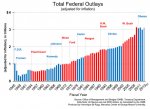- Joined
- Nov 13, 2009
- Messages
- 14,214
- Reaction score
- 4,666
- Gender
- Male
- Political Leaning
- Slightly Liberal
Uh huh
If you're referring to government debt, the "horror" a default, which happens when the government can't pay off the interest. This would be highly problematic for the United States, as we still have a reserve currency and the biggest economy in the world.
However, the chances of the US defaulting because it is unable to pay its bills? Extremely low.
In 2015, interest on the debt was $229 billion. Revenues were $3.2 trillion. Interest on debt is around 7% of federal revenues (and around 6% of federal spending).
And while default would be disastrous, it won't be the end of the world. Many nations have come back strong after a default... including the US, which effectively defaulted in 1790 and 1933.
While we should not take this as an excuse to continue profligate spending and a total abandonment of fiscal responsibility (such as, oh... slashing taxes for the wealthy and corporations, while increasing spending on defense and screwing our economy by starting trade wars), the reality is that federal debt is incredibly safe. The Horrors of Debt will not be visited up us any time soon.
Most educated people understand this, by the way. :mrgreen:
Using the above logic consistently would mean that you would be against spending money now to avoid some far in the future problem we might have due to climate change. With China growing its GDP at a 4-5X faster rate than we are, their having the largest economy and perhaps reserve currency will probably occur sooner than NYC will be underwater due to the seas rising.
Regarding the amount we spend on our debt. That may change in a major way fairly quickly. The Fed is expected to raise rate 3-4 times this year and a similar amount the year after. Plus we have the unwinding of QE which will have the effect of the US having to pay interest on an additional $3 trillion. So because the government for the last 7 years foolishly did not lock in low rates for super long periods of time, old cheaper debt will roll off and have to be replaced with new more expensive debt.


